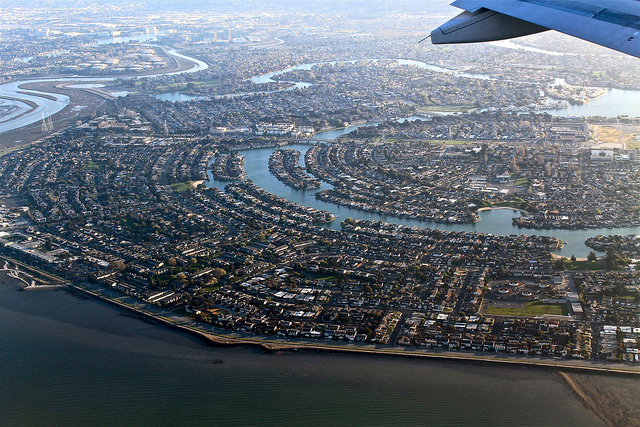It’s been 10 months in the planning, but when Indonesian President Joko Widodo flies to the United States next week the agenda for his 26 October meeting with President Barack Obama will be considerably different from when the country’s previous leader, Susilo Bambang Yudhoyono, visited the White House five years ago.
The two leaders may well touch on the South China Sea and other security issues, but Widodo will be all business—literally. Far from engaging Obama in matters of global, environmental or regional concern, as Yudhoyono liked to do, Widodo will concentrate on ways the US can help rejuvenate Indonesia’s flagging economy.
In fact, foreign affairs adviser Rizal Sukma says he wants to start where he left off when he met the US president for the first time at the Asia Pacific Economic Co-operation (APEC) Summit in Beijing last November, surprisingly him with his single-minded focus on the domestic economy.
Enhancing the US–Indonesia Comprehensive Partnership, which Yudhoyono and Obama signed in 2010, will be pursued by Widodo and his team of seven ministers, given its emphasis on science and technology, and education—two areas he sees as key to future growth.
Widodo particularly wants to explore cooperation in information technology and e-commerce and how US and its major corporations can help Indonesia grow its creative economy, another Yudhoyono initiative, which is expected to contribute to 12% of Indonesia’s total export value this year.
The Americans, for their part, will be looking to see whether Widodo has positive things to say about the recently-signed Trans-Pacific Partnership trade agreement (TPP), although Indonesia’s current priority is a free trade deal with the European Community which his advisers say may provide a shorter route to the TPP.
Widodo is well aware trade liberalisation won’t win him any friends at home, with nationalists and self-interest groups exploiting public apprehension over the ASEAN Economic Community, which comes into force at the end of the year. Rather than being perceived as an opportunity, it’s regarded more as a threat because of Indonesia’s lack of competitiveness.
The president will sign at least US$17.9 billion in new deals at a US Chamber of Commerce investment summit in Washington, swelling to US$36 billion if there’s a last-minute inclusion of Jakarta’s recent agreement in principle to extend the contract of US mining giant Freeport McMoRan Copper & Gold.
The company plans to invest US$18 billion on building a new smelter and transforming its Grasberg mine in Papua from an open pit into the world’s biggest underground operation. But foot-dragging on the extension had gone on for so long a breakthrough had become almost a pre-requisite for Widodo’s US visit.
The president must now amend a regulation under which the Government is only bound to begin contract-renewal negotiations two years before the expiry date—something Freeport can hardly live with and which has led it to delaying the mine conversion until 2018.
US companies contributed $65 billion in new investment in Indonesia between 2004 and 2013, with potential for an additional $61 billion between now and the end of Widodo’s term in 2019. But the challenges are immense, ranging from regulatory uncertainty to poor infrastructure and a shortage of skilled labour.
During his 26–28 October visit, the Indonesian president will sit down with Freeport CEO Richard Adkerson and senior executives of four or five other multinationals, before flying to California’s Silicon Valley for important meetings the Indonesians arranged with Microsoft, Apple and Google.
In a determined effort to revitalise the economy, aides say Widodo is dead-serious about re-focusing the economy away from natural resources and back on to manufacturing, in the same way as president Suharto’s New Order regime did at the end of the oil boom in the early 1980s with textiles, footwear and consumer electronics.
The president now understands that to attract the foreign investment needed to achieve that goal and also help fund a major infrastructure-building programme, he has to dispense with much of the economic nationalism policy he inherited—and initially embraced—from the Yudhoyono Government.
The Government has only recently issued its fourth package of stimulus measures and although they are considered so far to address the low-hanging fruit, policymakers have pledged to liberalise the creative-industry, e-commerce and health sectors to attract more outside investors.
Ministers and close aides say the president has every intention of continuing along the path of deregulation, not only for the next five or six months as US Ambassador Robert Blake suggested at a recent briefing, but until he’s satisfied all the impediments to an improved business climate are gone.
Officials say the normally-reserved Widodo is genuinely ‘enraged’ at the slow progress in clearing out what one calls the ‘thicket of regulations’ standing in the way, including a strange stipulation that overseas-based executives have to obtain temporary work permits to attend meetings in Indonesia.
In finally getting back on the same page as the president, the Manpower Ministry recently told a business gathering it would be retracting that regulation and also amending other contradictory provisions that have imposed limits on work permits and ex-patriot staffing levels.
So far, Widodo has found it to be three steps forward and one step back with ministries piling on the confusion by sending different signals and mixed messages. ‘This is not a flash in a pan thing,’ says one official. ‘He wants a rationalisation of policies and he wants deregulation in the field.’
Bringing in new chief economic minister Darmin Nasution is part of an effort to impose policy discipline on Indonesia’s notoriously uncooperative bureaucracy. That and the extent of deregulation is likely to have a far more far-reaching impact than anything he achieves on his four nights in the US.


